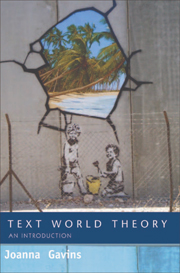7 - Distances
Published online by Cambridge University Press: 05 August 2013
Summary
KEY ISSUES IN THIS CHAPTER
This chapter continues the examination begun in Chapter 6 of the text-worlds which relate to remote or unrealised situations. As we have already seen in the preceding analysis of instructive and informative discourses, the creation of imaginary states of affairs is not confined to literary fiction alone, but is a common feature of all types of communication in the everyday world. In Chapter 6 we saw how expressions of unfulfilled wishes and desires trigger the creation of discrete text-worlds with their own world-building and function-advancing elements. Such boulomaic and deontic modal-worlds, whether they originate in the discourse-world or in a text-world, exist at a conceptual distance from their creators. In the present chapter, the notion of conceptual distance will be explored in more detail and the investigation of the text-worlds of modalised discourse will be extended. The discussion here concentrates on the articulation of knowledge and belief through language and the processes by which such abstract concepts are conceptually managed. Two different types of political discourse, a speech and a transcript of a television debate, are analysed in order to uncover the conceptual structures which underpin them.
- Type
- Chapter
- Information
- Text World TheoryAn Introduction, pp. 109 - 125Publisher: Edinburgh University PressPrint publication year: 2007



